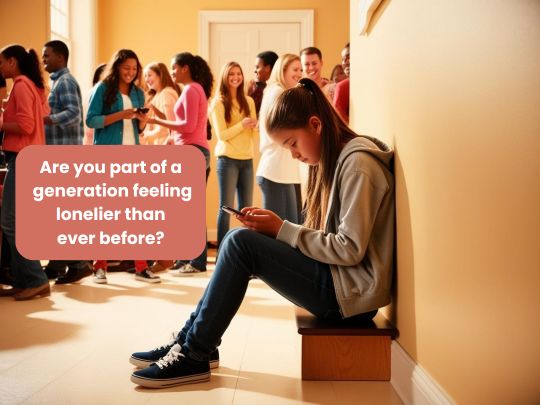
There was a time when loneliness – a state of being without companions – was an experience mostly associated with older generations. Yet, its impact is spreading. So much so, its roots are now taking hold of Gen Z.
New research by The King’s Trust reveals that more than a third of young people (35%) always or often feel lonely, according to the Youth Index 2025, an annual report which polls over 4,000 16 to 25-year-olds across the UK. Worryingly, the figure increases to 46% when young people from poorer backgrounds are reviewed – shaped by financial pressures, mental health challenges and ongoing deprivation.
So, what are young people doing wrong? Absolutely nothing.
Multiple societal factors feed into this landscape. With families needing to work harder to sustain themselves, something’s got to give, and in-person experiences are often the first to go. These opportunities, such as mealtimes, are replaced with social media (which creates its own problems for our mental health). That’s before we casually mention how Covid-19 forced young people to transition all their interpersonal development online overnight – creating discomfort during their formative years particularly around relationship building.
When I look back at my own adolescence, both my parents worked full time and that meant once I’d outgrown holiday clubs, I was responsible for entertaining myself. On some days this involved meeting friends, but on others I had to invest in solo activities such as going for a walk, reading a book or listening to music.
Little did I know this was essential training for my future middle-aged life.
Today, I live alone and pride myself on being independent, but I’m aware there are times, albeit rare, when I won’t physically speak to anyone. On some days this is my ideal arrangement, and others it’s excruciatingly painful because it drives me to stew on my thoughts which flip-flop between mean and mundane.
Yet, regardless of how I arrive at those situations, I acknowledge it was my choice to withdraw. If I was to dig deeper, I’d even suggest I was subconsciously keeping people away as a defence mechanism to protect myself from others who could hurt my feelings. So, guess what? I hurt me first.
Stubborn solitude aside, if loneliness is causing this much concern, how should we manage it?
Psychologist Carl Jung famously said, ‘what you resist, persists’ – implying that accepting negative emotions as part of the tapestry of life is the healthiest way to deal with them.
There’s some wisdom in this. Not just because everyone’s likely to feel lonely at some point, but also because once you learn not to outrun life’s challenges, it opens the door to true freedom to enjoy it.
But, with loneliness affecting younger generations sooner, we must take action. After all, loneliness has strong associations with depression and anxiety.
Top tips for overcoming loneliness
This is a good time to emphasise that loneliness isn’t the same as being alone and solitude isn’t always bad. We’re complicated like that. So, consider some of these tips:
- Deepen existing connections with friends or family by being honest about how you’re feeling. How would it feel to develop an accountability agreement with someone you trust to intentionally check-in with one another when either of you feel lonely? Not only does this normalise the experience, but it also helps break any negative thought cycles to retain a healthy perspective.
- Learn people’s names and use them. Our names are powerful and they enhance conversations by making interactions more personal. Next time you’re ordering a coffee or at a check-out, why not start a conversation with your server, thank them by name and reflect on the experience? The result might surprise you.
- Track your feelings. If you’re feeling lonely, don’t shut it down. Spend a few moments acknowledging it by jotting it down in a notebook or creatively expressing yourself through arts and craft, to make the emotion easier to examine, understand and relate to. You may even spot patterns that you can use to adjust your outlook.
Talking therapy is also a useful outlet. By working with a confidential, non-judgemental counsellor, you can explore the impact of loneliness on your physical and emotional health, as well as develop coping strategies to live alongside it, opposed to under it.
If you’ve been affected by loneliness and want to explore affordable, long-term counselling in New Malden to improve your mental health, complete our Fountain Therapy Trust form or speak to our team to learn more.
Donna is an integrative counsellor running a small private practice, while supporting The Fountain Therapy Trust.
